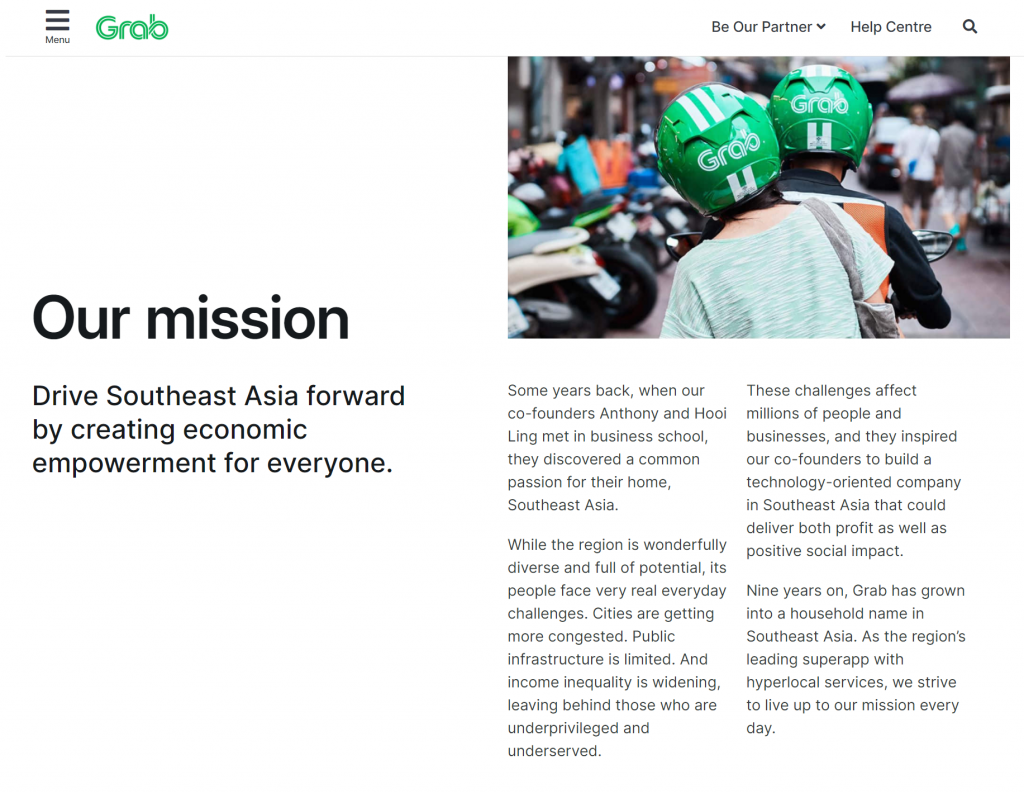
Grab Holdings Ltd, commonly known as Grab, is a Singapore-based technology company that provides services including transportation, food, and grocery delivery, and online payment. Founded in 2012, it is the first decacorn (Valued over $10 billion) company in Southeast Asia.
The idea of launching an Uber-Esque taxi-hiring app came to Anthony Tan, the co-founder of Grab’s mind when one of his classmates in the Harvard Business School complained about the hassle he had to face to hire a taxi in Malaysia back in 2011. Anthony Tan pitched the idea in the Harvard Business Plan Competition and won the second prize. With the prize money, which was $25000, and his own savings, Anthony Tan, along with another Harvard Business School graduate Tan Hooi Ling, launched ‘MyTeksi’, a taxi booking app, in 2012 in Kuala Lumpur of Malaysia.
Later, in 2013, they renamed the company to GrabTaxi. The same year, Grabtaxi expanded its operation in three Southeast Asian countries: the Philippines, Singapore, and Thailand. The following year, the company partnered up with HDT Holdings and onboarded 100 BYD e6 electronic taxis on its platform, forming the biggest electronic taxi fleet in the region. Grab expanded its territory, launching in Ho Chi Minh City of Vietnam and Jakarta of Indonesia the same year. Since it becomes hard to find a taxi in Metropolitan areas during peak hours, in 2014, Grab introduced ‘GrabCar’, an alternative to ‘GrabTaxi’, through which users can hire personal cars instead of taxis. Grab’s motorbike service ‘Grabbike’ was in the Ho Chi Minh City of Vietnam in the same year.
The same year, Temasek, the investment fund of the Singapore government, invested $10 million in Grabtaxi, and Grab moved its headquarters from Malaysia to Singapore.
By 2015, the company expanded its motorcycle service Grabbike in Vietnam and Indonesia. Besides providing transportation services, Grabbike also provides medical insurance for both its riders and passengers. In February 2015, Grab introduced ‘GrabCar+’, a fleet of expensive cars, in the Philippines.
In January 2016, the company again renamed itself to Grab as it keeps on adding more and more services.
In November 2016, Grab launched ‘GrabPay’, a digital payment service. In October, the company added a new feature ‘GrabChat’, to enable in-app communication between the rider and the driver of Grab.
The following year Grab launched ‘GrabCoach’, a service to book vehicles for a large number of passengers.
In March 2017, Grab introduced ‘GrabFamily’, a service to book vehicles with child restraint seats for children whose height is under 1.35 meters, who are not allowed in private cars according to the rule of LTA (Land Transport Authority).
In April 2017, Grab acquired Kudo, an Indonesia-based digital payment startup, expanding its territory in the fintech industry in the Southeast Asian region.
In March 2018, Grab took over Uber’s entire operation and services in the Southeast Asian region, after which Grab introduced its food delivery service ‘GrabFood’, in May, the same year. Around the same time, Grab launched ‘GrabWheels’, an e-scooter rental service. In the same year ‘GrabExpress’ and ‘Grab Finance’ were launched which are the courier service and the financial arm of Grab, respectively. In November Grab invested in Ovo, Indonesia’s leading online payment gateway.
By 2019, within just seven years since its inception, Grab has achieved exponential growth expanding its operation in eight South-East Asian countries: Singapore, Indonesia, Cambodia, Malaysia, Myanmar, the Philippines, Thailand, and Vietnam
As COVID-19 hit in 2020, Grab slashed 20% of the salary of its top management to manage costs. The company also laid off 350 employees in May 2020. Moreover, Grab encouraged its employees to take no-pay leave voluntarily during the pandemic. In response to the pandemic, GrabProtect was introduced, which promotes new safety features, updated safety policies, and supplies hygiene kits to drivers and passengers, to ensure hygiene in its ride-hailing service.
In December 2020, Grab along with Singtel were granted a digital banking license from Singapore Government, as a consortium. In January 2021, South Korea’s Hanwha Asset Management, S.Korea's leading comprehensive asset management company, invested over $300M in Grab.
The company’s current valuation is close to $16B and Grab is planning to merge with a SPAC (Special Purpose Acquisition Company) backed by silicon valley investor Altimeter Capital Management, for a Nasdaq listing.

Read:
Commentary: Anthony Tan, the ‘unabashedly ambitious’ man behind Grab: Two years after founding his Uber-like taxi service, Anthony Tan was already unabashedly ambitious. “If we get this right, we can literally go into the history books,” the Harvard Business School-educated entrepreneur proclaimed in 2014. Seven years later, the 39-year-old scion of one of Malaysia’s wealthiest families is poised to do exactly that.
How Asia's Ride-Hailing Giant Grab Debunks 3 Startup Myths: We tell ourselves that entrepreneurship is the fairest game in business. The smartest and hardest working entrepreneur wins. Our society tolerates and justifies disproportional financial rewards to household heroes: Elon Musk, Bill Gates, Jeff Bezos.
It’s a narrative that even governments and universities can’t resist. Governments tell the unemployed to work on gigs. Even economic development agencies are obsessed with turning their countries into “startup nations.”
The myths of entrepreneurship collapse under the examination of Grab’s deal.
Grab technology boosts economic opportunities, financial access in Kalimantan: When Grab entered Tarakan in 2017 it brought benefits for both consumers and businesses. The mayor of Tarakan noted that when the government continues to develop the infrastructure and facilities to empower local entrepreneurs, they are unable to progress effectively without broader support, particularly from the private sector with digital platforms like Grab.
Grab's $40bn SPAC plan puts CEO Anthony Tan in driver's seat
Watch:
How Grab won the ride-hailing industry in Southeast Asia: The ride-hailing industry is one of the most competitive in the world, but in Southeast Asia, Grab has won the battle.
Grab Co-Founders Anthony Tan and Hooi Ling Tan on 'Bloomberg Studio 1.0': Bloomberg Technology's Emily Chang speaks to Grab Co-Founders Anthony Tan and Hooi Ling Tan about the Southeast Asian ride-hailing business on the latest episode of "Bloomberg Studio 1.0." In the exclusive conversation, they tell us how the company partnered with Uber, adding Dara Khosrowshahi to their board, and how they have their sights set on becoming a super-app.
Hooi Ling Tan: Co-Founder of Grab: In this episode of Talks at Goldman Sachs, Grab Co-Founder Hooi Ling Tan discusses growing the ride-hailing platform in Southeast Asia and how digitizing the region’s economy has helped empower both drivers and customers.
Lessons From Grab:
Though many companies prefer to stay in their niche, Grab is one of those companies that like to experiment with new ideas and go out of their lane. Instead of sticking to only taxi booking services, Grab gradually added other ride-sharing services such as GrabCar, GrabBike, GrabHitch (carpooling service), GrabCoach (large passenger vehicles), GrabFamily, etc. Furthermore, the company expanded its business beyond ride-sharing and added services like food delivery, online payment, turning the app into a super app.
In 2018 the company launched Grab Financial to provide payment, insurance, and financing services. From Grab’s trajectory, one thing can be said for sure that, one of the main reasons behind Grab’s massive growth is its diversification. Not only Grab but also other companies such as Alibaba and Gojek have followed the same path to expand their business.
This can be a lesson for other startups as well. Though staying in a single niche can be safer, expanding business in other areas can also help a company to get traction.
From the very beginning, Grab founders have focused on finding the right partners. In terms of expanding their business and bringing diversification in their services, Grab tries to partner up with the right companies who have the experience they lack.
For example, Grab has partnered up with Krungsri Finnovate, the corporate venture capital firm of the Bank of Ayudhya, to provide financial services on Grab's platform as well as to promote sustainable banking.
Similarly Grab has also partnered with Chubb, a Switzerland-based global provider of insurance products, to provide innovative, customized, and cost-effective in-app insurance solutions.
Many other large global companies such as Microsoft, Hyundai, Kia. booking.com etc have partnered up with Grab to provide advanced technology-based services such as EV, AI, etc. Building smart partnerships not only has helped Grab to build a network across the globe, but also to keep pace with the ever-changing ecosystem.
When it comes to user experience Grab has definitely excelled in this. Using the trip monitoring technology, Grab keeps track of the routes the vehicles registered under this platform are taking while giving a trip. It also uses telemetric data to detect any car accidents which can trigger emergency calls for an ambulance. Grab has partnered up with Microsoft to integrate artificial intelligence and face recognition technology in its system, to detect the face of both the drivers and the passengers to ensure safety.
In terms of its food delivery service, Grab uses a top-of-the-shelf data-driven approach which helps its partner restaurants to find the right route to deliver food faster. By using a cloud kitchen network Grab enables its users to have more options while ordering food.
